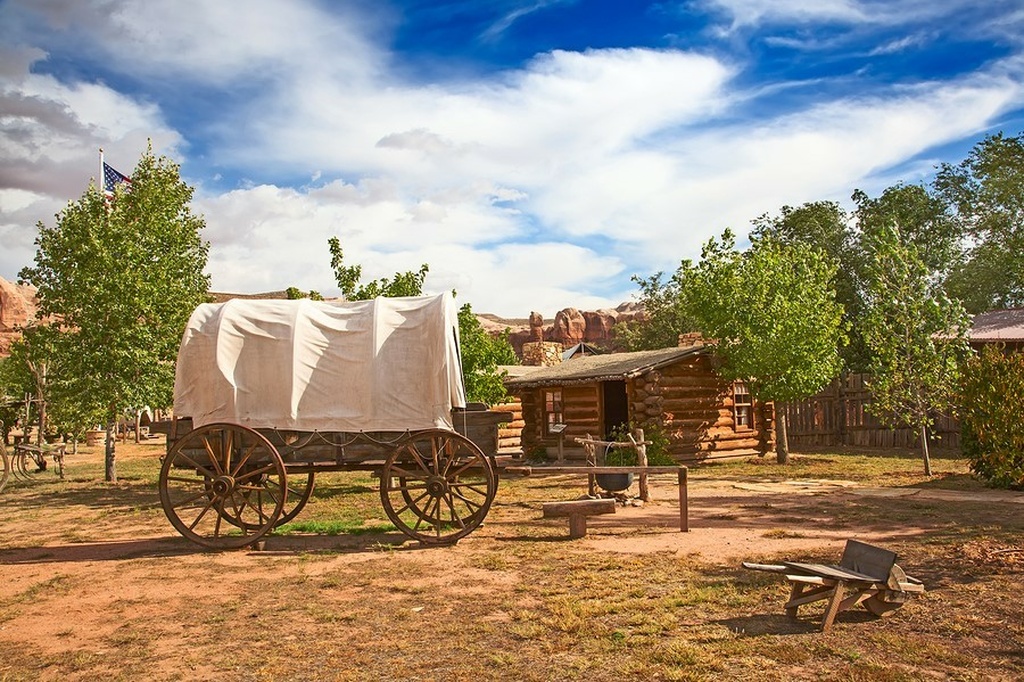
Outposts of Christ’s Kingdom
"Today, as the world more openly embraces humanism, our religious institutions, schools, families, and callings must see themselves as outposts of Christ’s Kingdom, local gatherings of the citizens of the new creation."

- Chalcedon Editorial
In a marvelous description of our inheritance in Christ, the apostle Peter presents the church as a chosen generation, a royal priesthood, and a holy nation (1 Peter 2:9), but two verses later he refers to his readers as “strangers and pilgrims” (v. 11). This is an interesting dichotomy since both must be true. Are we a royal priesthood or just pilgrims passing through?
To the world, we are strangers and pilgrims—or at least should be—but in Christ, we are that holy nation and royal priesthood. A pilgrim is one who journeys for religious reasons, but the pilgrimage begun with the early church was anything but temporary wandering. We are strangers because we are not of this world, and we do not operate in terms of its humanism. We are, as Rushdoony notes, positioned throughout the world for the sake of the Kingdom of God:
Today, as the world more openly embraces humanism, our religious institutions, schools, families, and callings must see themselves as outposts of Christ’s Kingdom, local gatherings of the citizens of the new creation.[1]
Strangers and Pilgrims
The Old Testament saints “died in faith, not having received the promises, but having seen them afar off, and were persuaded of them, and embraced them, and confessed that they were strangers and pilgrims on the earth” (Heb. 11:13). The writer of Hebrews says, “they desire a better country, that is, an heavenly” (v. 16). Rushdoony writes of the nature of this “heavenly country”:
They were promised more than a land for themselves: they expected a new society founded on God’s law and word, and it was this they longed for. This new city or social order would be the reverse of the Tower of Babel: its purpose would be, not the glory of man, but the glory of God. The world around them gave evidence of a steady deterioration. Their pilgrimage, and that of all the saints of the Old Testament, was towards the Kingdom or City of God.[2]
The more deteriorated the world is, the more we are like strangers and pilgrims, but as such, we remain the outposts of the Kingdom of God. The mystery lies in the fact that “our conversation (citizenship) is in heaven” (Phil. 3:20) and that the Kingdom of God is a reality for us now. Our objective, therefore, is to live in terms of it:
There is no kingdom for us, if we are not in the kingdom now; there is no new creation we can look forward to in eternity, if we are outside the new creation now. The kingdom is and is to come; the new heavens and new earth are and are to come. The fullness is at the end of time, but it is here today in reality. This means that Christians are neglecting their inheritance and failing to make use of their power in Christ: they live in terms of victory tomorrow instead of victory today, in terms of joy tomorrow instead of joy today. How can we enjoy heaven if we cannot enjoy earth? How can we rejoice in the eternal order beyond time, when we cannot rejoice in the new creation today? Revelation was written to suffering and troubled Christians, and also to smug and self-satisfied Christians, who alike waited for the kingdom to come and felt that the world’s problems presented a hindrance to Christ and His kingdom. But Revelation makes clear that the kingdom is now, and that, not by evading conflict, responsibility, and suffering, but by assuming it, do Christians and the Church gain their inheritance. Both compromise with the world and flight from it assume that Christ is impotent and that His kingdom is in the future and has no power today.[3]
We are the extension of that heavenly reality in the earth, and as Rushdoony wrote, a compromise with the world, or a flight from it, are assumptions that the Kingdom of God has no effect now in history. Instead, the reality of the Kingdom of God being now is that we are in direct conflict with the Kingdom of Man. Rushdoony spoke,
Christians are members of the Kingdom of God. They have, therefore, a dual citizenship. They are an outpost of heaven. They are ambassadors of Christ. They belong to two worlds. They have two citizenships, and they represent therefore an invading force wherever they are … A church which is an outpost, with a commission to conquer. To make disciples of all nations. This is the commission.[4]
Christian Reconstruction Is Not a Movement
When we speak of the Christian worldview, is this not the essence of it—to be outposts of Christ’s Kingdom? The common meaning of a Christian worldview is to see all of life in Biblical terms but for what purpose? To view something is to be passive, but to engage this world for the sake of applying our worldview is Christian Reconstruction.
As humanism continues its decline, Kingdom-oriented Christians appear more as strangers and pilgrims, but in reality we are also outposts—a position at some distance from the main force—and our duty is to the Kingdom we represent.
Of course, this puts us in direct conflict with humanism and its statism, but our resources are as vast as the Kingdom we serve. Therefore, shouldn’t we be driven to greater Christian action? Isn’t now an opportune time to share the message of Christian Reconstruction with our Christian brothers and sisters who are looking for answers or a way forward?
Christian Reconstruction is not a movement that had its heyday. It is the essence of Christian responsibility for all time, and its success depends a great deal upon how effective we are at living and communicating this message.
Outside of being faithful in your own calling, with your own family, and in your own church, you can make a significant difference in helping to advance the cause of Christian Reconstruction by supporting the Chalcedon Foundation with your tithes and offerings. We desperately need your financial support, so please take a few moments today to prayerfully consider sending your most generous tax-deductible gift to Chalcedon today. For the sake of ease, you’re welcome to donate online today.
[1] R. J. Rushdoony, Institutes of Biblical Law, Volume 2, Law & Society (Ross House Books: Vallecito, CA, [1982] 1986), p. 342.
[2] R. J. Rushdoony, Hebrews, James & Jude (Ross House Books: Vallecito, CA, 2001), p. 112.
[3] R. J. Rushdoony, Thy Kingdom Come: Studies in Daniel and Revelation (Ross House Books: Vallecito, CA, 2001), p. 215.
[4] R. J. Rushdoony, audio lecture “Typology and History (Ephesus)” from Revelation. https://chalcedon.edu/resource...

- Chalcedon Editorial